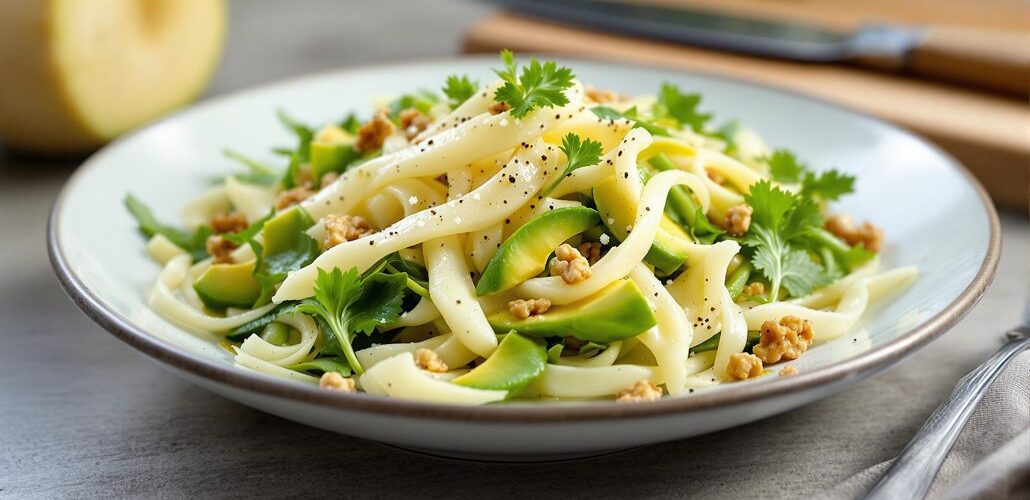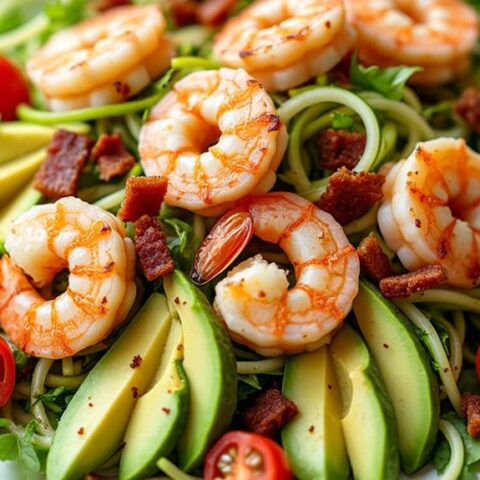
Jicama is keto-friendly due to its low net carbohydrate content and high dietary fiber. With only 5.6 grams of net carbs per cup, it supports low-carb intake essential for maintaining ketosis. The dietary fiber in jicama, particularly inulin, also acts as a prebiotic, promoting gut health and enhancing feelings of fullness. Its low glycemic index guarantees stable blood sugar levels, reducing the risk of insulin spikes. Additionally, jicama's high levels of vitamin C and potassium contribute valuable nutrients without disrupting carbohydrate limits. Exploring jicama's nutritional benefits reveals why it's a staple in keto-conscious eating plans.
Key Takeaways
- Jicama contains only 5.6 grams of net carbs per cup, making it suitable for low-carb, ketogenic diets.
- Its high fiber content reduces net carb intake, supporting ketosis and digestive health.
- The low glycemic index of jicama helps stabilize blood sugar levels, ideal for keto diets.
- Jicama's versatility allows substitution for higher-carb ingredients, maintaining low-carb meal options.
- It provides essential nutrients like vitamin C and potassium without disrupting carb limits.
Understanding Jicama
Jicama, commonly referred to as yam bean, is a root vegetable prized for its nutritional benefits and versatility in low-carb diets. Its unique composition makes it an ideal component for those following a keto lifestyle. With approximately 38 calories and 8.82 grams of carbohydrates per 100 grams, jicama is a low-calorie option that aligns well with ketogenic principles.
The high dietary fiber content, around 4.9 grams per 100 grams, considerably reduces its net carbs to about 3.92 grams. This characteristic is essential for maintaining ketosis, a metabolic state vital for keto diets. Additionally, incorporating low-carb, high-fiber foods, like jicama, can help support gut microbiome health while on the keto diet.
The health benefits of jicama extend beyond its low net carb content. Rich in essential nutrients such as vitamin C and potassium, jicama supports overall health while contributing to the low-carb nature of the diet. Its high water content, approximately 90%, aids in hydration, offering a revitalizing and crunchy alternative to higher-carb foods.
Furthermore, jicama's low glycemic index assists in stabilizing blood sugar levels, further supporting the maintenance of ketosis. To conclude, jicama's nutritional profile and low net carb count make it an excellent choice for individuals committed to a low-carb diet.
Nutritional Breakdown
Building upon the understanding of jicama's role in a keto diet, its detailed nutritional breakdown further emphasizes its suitability for this dietary approach.
Jicama contains approximately 5.6 grams of net carbs per cup, positioning it as a favorable low-carb option within the constraints of a ketogenic diet. This is achieved due to its total carbohydrate content of 12 grams per cup, offset by 6.4 grams of dietary fiber. This significant fiber content not only lowers the net carb count but also contributes to its overall health benefits, supporting digestive health without exceeding ketogenic macronutrient limits.
In comparison, non-starchy vegetables like spinach and kale, which are keto-friendly, also offer essential vitamins and minerals while maintaining low carb counts.
With regard to nutritional content, jicama is exceptionally low in calories, with just about 49 calories per cup. This makes it an excellent choice for those aiming for weight management while adhering to a keto diet.
Additionally, jicama is rich in essential nutrients like vitamin C, which is vital for immune function and antioxidant protection. The presence of potassium further enhances its nutritional profile, contributing to cardiovascular health.
As a result, jicama's combination of low net carbs, high dietary fiber, and essential nutrients underscores its role as a healthful component of a ketogenic diet.
Fiber and Digestion
Jicama's high dietary fiber content, with 6 grams per cup, plays an essential role in aiding digestion and ensuring regular bowel movements, making it an excellent choice for those on a keto diet.
The inulin fiber found in jicama acts as a prebiotic, fostering the growth of beneficial gut bacteria and thereby supporting overall gut health.
Additionally, its low net carbohydrate count allows for increased fiber consumption without disrupting the carbohydrate restrictions inherent in a ketogenic diet.
High Fiber Content
The high-fiber content of jicama plays an important role in promoting digestive health and supporting a ketogenic lifestyle. Jicama contains approximately 6 grams of fiber per one-cup serving, contributing considerably to daily fiber needs without adding high carb content.
This fiber content is vital for those on a keto diet, as it helps to manage net carbs effectively. With only 5.6 grams of net carbs per cup, jicama fits well into the daily carb intake limits of a ketogenic regimen. The fiber in jicama also aids digestion by adding bulk to the stool, thereby preventing constipation and promoting regular bowel movements.
- Net Carbs Management: The fiber in jicama helps lower overall blood sugar impact, aligning with ketogenic principles.
- Digestive Health: Adds bulk to the stool, assisting in regular bowel movements and preventing constipation.
- Satiation: Enhances feelings of fullness, aiding in appetite control and supporting weight management on a keto diet.
- Nutrient Dense: Provides essential nutrients without high carb content, making it a smart choice for keto enthusiasts.
Incorporating jicama into a keto diet not only supports digestive health but also aligns perfectly with the dietary restrictions required for ketosis.
Supports Gut Health
Beyond its role in managing net carbs, the fiber content of jicama greatly contributes to gut health, particularly through its high inulin content. Inulin, a type of prebiotic fiber found in jicama, plays an essential role in fostering the growth of beneficial gut bacteria. This process enhances overall gut health by promoting a balanced microbiome, which is crucial for efficient digestion and nutrient absorption. Moreover, the 6 grams of fiber per cup of jicama support regular bowel movements and prevent constipation, making it a valuable addition to a ketogenic diet focused on digestive well-being.
| Nutrient | Amount per Cup | Health Benefit |
|---|---|---|
| Fiber | 6 grams | Supports digestion |
| Inulin | High content | Promotes gut bacteria |
| Glycemic Index | Low | Stabilizes blood sugar |
Jicama's low glycemic index additionally enhances its appeal by stabilizing blood sugar levels, minimizing digestive discomfort associated with rapid glucose spikes. Furthermore, the fiber content contributes to feelings of satiety and fullness, aiding in appetite regulation and supporting weight loss efforts on a keto diet. By integrating jicama into dietary regimens, individuals can enjoy a fiber-rich, gut-friendly food that aligns with the principles of low-carbohydrate eating plans.
Low Glycemic Impact
Jicama's low glycemic index is instrumental in maintaining blood sugar stability, an essential aspect of the ketogenic diet.
The root vegetable's high fiber content contributes to the slow absorption of carbohydrates, minimizing rapid fluctuations in glucose levels.
This characteristic not only aids in sustaining ketosis but also supports overall metabolic health by preventing insulin spikes.
Blood Sugar Stability
Due to its low glycemic index, jicama is an excellent choice for those aiming to maintain stable blood sugar levels, making it highly compatible with low-carb and keto diets. This root vegetable is not only a keto-friendly alternative but also helps regulate blood sugar levels effectively.
With only 5.6 grams of net carbs per cup, jicama supports a low-carb lifestyle, minimizing the risk of blood sugar spikes. The high fiber content, particularly inulin, plays an essential role in maintaining blood sugar stability by moderating the rate of carbohydrate absorption.
The addition of jicama into a dietary regimen offers numerous benefits:
- Low Glycemic Index: Jicama causes a minimal increase in blood sugar levels, making it a preferred option for those on keto diets.
- Rich in Fiber: Its high fiber content enhances satiety and prevents overeating, which can contribute to sudden blood sugar fluctuations.
- Net Carbs: With low net carb content, jicama aligns well with keto dietary goals.
- Nutrient Support: Essential nutrients like vitamin C in jicama contribute to overall metabolic health, essential for blood sugar regulation.
Incorporating jicama into meals can therefore be a strategic move to maintain balanced blood sugar levels.
Slow Carb Absorption
Renowned for its low glycemic index, jicama plays an essential role in moderating blood sugar levels, making it an ideal choice for those adhering to a ketogenic lifestyle. The low glycemic impact of jicama guarantees a slower rise in blood glucose levels compared to high-GI foods. This slow carb absorption is fundamental for maintaining stable energy levels on a keto diet, which prioritizes low carbohydrate intake.
With only 5 grams of net carbs per cup, jicama offers a low-carb option that aligns well with keto dietary requirements.
Moreover, the high fiber content in jicama—6 grams per cup—contributes considerably to digestive health. This fiber not only aids digestion but also promotes a feeling of fullness, which can help manage appetite and reduce overall calorie consumption.
Jicama's primary carbohydrate, inulin, serves as a prebiotic, further enhancing gut health and contributing to the slow absorption of carbohydrates. This slow absorption is advantageous for improving insulin sensitivity, an advantage for those following a ketogenic diet.
Keto Compatibility
Incorporating jicama into a ketogenic diet can be highly beneficial due to its low carbohydrate content. Jicama, a root vegetable, contains only 5.6 grams of net carbs per cup, making it an excellent option for those focused on maintaining a low-carb intake. The high fiber content, approximately 6 grams per cup, not only aids digestion but also effectively reduces the net carb count, enhancing its keto compatibility.
Additionally, non-starchy vegetables like jicama support nutrient intake without disrupting low-carb goals, similar to other keto-friendly options such as spinach and kale. This unique nutritional profile allows for the creation of keto-friendly dishes such as keto jicama fries, offering a healthier alternative to traditional high-carb ingredients.
Moreover, jicama's low glycemic index guarantees minimal impact on blood sugar levels, a critical consideration for individuals following a ketogenic lifestyle. This property helps stabilize glucose levels, fostering a more consistent energy supply and reducing the risk of insulin spikes.
As a versatile root vegetable, jicama can be incorporated into numerous recipes, allowing it to substitute higher-carb options seamlessly.
- Net Carbs: Only 5.6 grams per cup
- Fiber: Provides 6 grams per cup, aiding digestion
- Low Glycemic Index: Stabilizes blood sugar levels
- Versatility: Substitute for higher-carb ingredients in recipes
These factors establish jicama as a favorable choice for those adhering to a ketogenic diet.
Recipe Ideas
Jicama's versatility shines in its adaptability to a variety of keto-friendly recipes, making it a valuable ingredient for those seeking innovative low-carb meal options. Known as the Mexican yam bean, jicama offers a revitalizing alternative to higher-carb staples like potatoes.
For instance, baked jicama fries can effectively replace traditional potato fries, containing just 5.6 grams of net carbs per cup, making them an excellent side dish choice for keto enthusiasts. In addition to its role as a potato substitute, jicama's crunchy texture and mild flavor make it a delightful addition to salads and salsas, contributing minimal net carbs.
When spiralized or sliced into sticks, jicama becomes a nutritious snack or a creative filling for spring rolls, supporting a low-calorie, low-carb diet—approximately 38 calories per 100g. Jicama shares this versatility with other vegetable-based pasta alternatives like zucchini noodles and spaghetti squash, which are popular in keto diets.
For those seeking more cooked options, roasted or air-fried jicama serves as a flavorful side dish that enhances meals while maintaining a low carbohydrate profile, with around 10.47 grams of carbohydrates per serving.
Additionally, incorporating jicama into desserts, such as a keto-friendly jicama apple filling, showcases its versatility, allowing for healthy baking alternatives while adhering to ketogenic dietary principles.
Considerations and Tips
While exploring the myriad of keto-friendly recipes featuring jicama, it is important to also consider some practical tips and considerations to maximize its benefits. Jicama is lauded for its low-carb option status, with only 5.6 grams of net carbs per cup, making it ideal for maintaining ketosis.
Its high fiber content of 6.4 grams per cup not only aids in promoting digestive health but also effectively minimizes net carb intake, an essential factor for those following a ketogenic diet. In addition, jicama's potential to improve hydration aligns with keto's goal of enhancing metabolic health.
Jicama's versatility further enhances its appeal, serving as a substitute for higher-carb ingredients in various keto meals. From fries to salads, its adaptability can help diversify your culinary experiences while adhering to dietary restrictions. Additionally, the high water content—approximately 90%—contributes greatly to hydration, providing a revitalizing component to your diet.
Consider these tips to optimize jicama's inclusion in your keto journey:
- Incorporate jicama as a substitute: Use jicama in place of higher-carb vegetables in recipes.
- Monitor portion sizes: Verify net carb intake aligns with your dietary goals.
- Prioritize hydration: Utilize jicama's high water content to support daily hydration.
- Experiment with preparation methods: Try raw, steamed, or baked options to suit your taste preferences.
Frequently Asked Questions
Is Jicama Ok for a Keto Diet?
Jicama is suitable for a keto diet due to its low net carb content, high fiber, and health benefits. It serves as a nutritious alternative to potatoes in various recipes, offering diverse snack ideas while promoting digestive health.
Is Jicama Full of Carbs?
Jicama is not full of carbs compared to potatoes. It contains significant fiber content, lowering net carbs. Jicama nutrition facts highlight its health benefits, making it ideal for diverse recipes. Cooking methods enhance its versatility.
Is Jicama Good for You to Lose Weight?
Jicama is beneficial for weight loss due to its low calorie and high fiber content, promoting satiety and aiding digestion. Its nutritional value, including essential vitamins and minerals, enhances health benefits. Incorporate jicama into various recipes for ideal results.
Why Himalayan Salt for Keto?
Himalayan salt benefits a ketogenic diet through its rich mineral content, promoting electrolyte balance and offering health advantages. Its low sodium level and flavor enhancement capabilities make it an ideal choice for maintaining hydration and supporting overall wellness.
Conclusion
Jicama emerges as a keto-friendly food due to its nutritional profile, which includes a high fiber content and low glycemic impact. The substantial fiber promotes digestive health while minimally affecting blood glucose levels, aligning with the ketogenic diet's requirements. Its compatibility with keto diets is further enhanced by its versatility in recipes. When incorporating jicama, consideration of portion sizes and preparation methods is essential to maximize its health benefits within a ketogenic framework.









No Comments